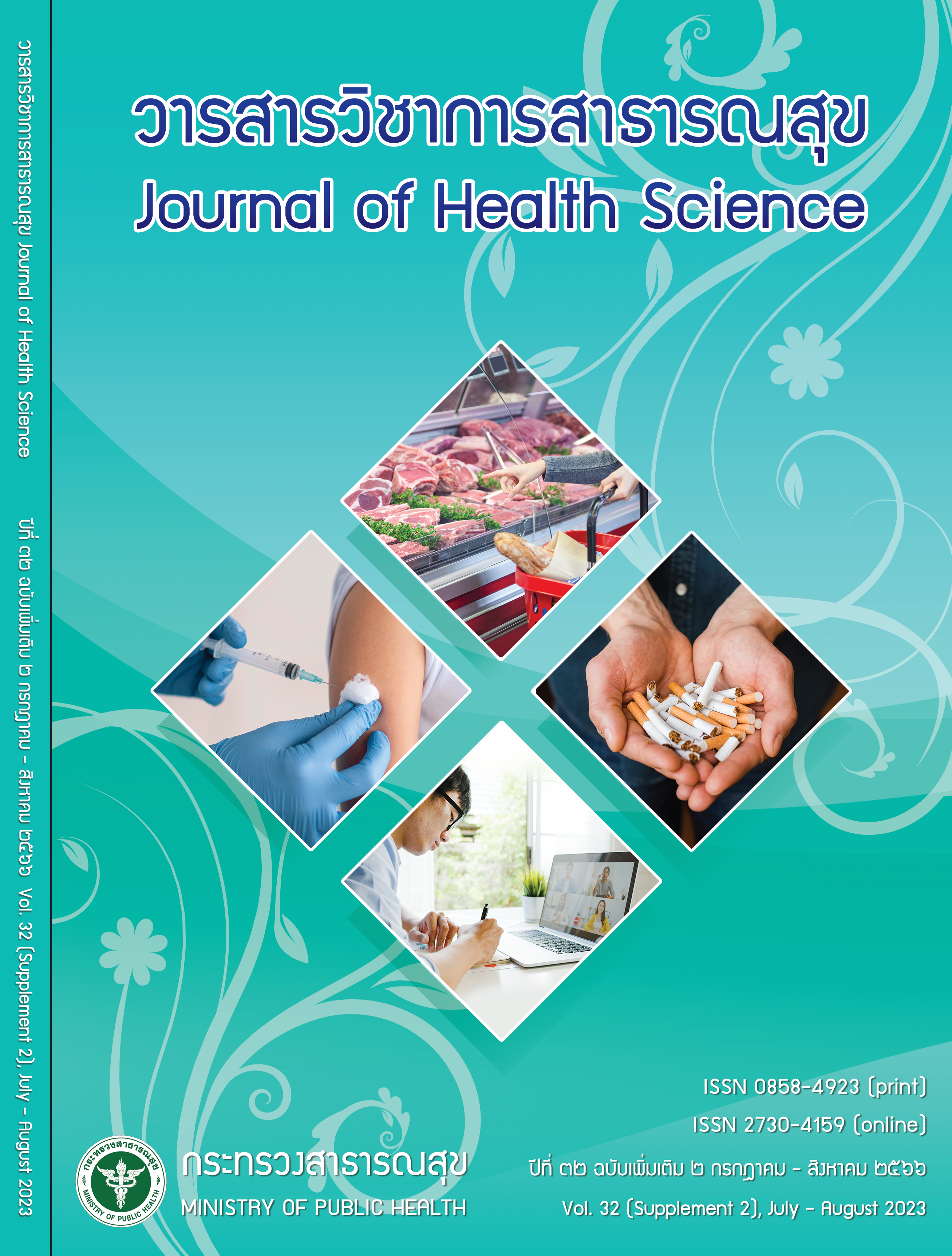Prevalence and Factors Associated with Stress after Continuous Online Learning among Thaksin University Students, Phatthalung Campus, Thailand
Keywords:
stress, online learning, COVID-19Abstract
This research is a cross-sectional analytical study to assess the prevalence of stress and factors associated with after continuous online learning among Thaksin University students, Phatthalung Campus. The researcher calculated 385 samples with Taro Yamane formula and stored data with queries that include stress measurements related to the barriers of online learning, burnout syndrome measurements and Suanprung Stress Test-20 (SPST-20). The reliability score was 0.97, 0.98 and 0.99, respectively. They were used to analyze stress-related factors using binary logistic regression statistics. As a result, the majority of respondents were female, second-year students in the faculty of health and sports sciences, with a grade of 3.01 or higher. For the burnout syndrome study, the majority was a low level of emotion exhaustion online learning (40.8%), a low level of depersonalization (39.7%), and a decrease in reduced personal accomplishment (71.2%). For the study of stress, prevalence of stress levels was found that most students had severe stress (46.0%), followed by high stress (27.3%), and moderate stress (22.3%). When analyzing factors associated with stress from continuous online learning, it was found that content understanding factors of online learning (ORadj 1.18, 95%CI=1.07-1.31) and emotional exhaustion (ORadj 1.19, 95%CI=1.06-1.39) were statistically significantly associated with continuous online learning during COVID-19 pandemic (p<0.05).
Downloads
References
World Health Organization. Coronavirus disease (COVID-19) [อินเทอร์เน็ต]. 2564 [cited 2021 Dec 15]. Available from: https://www.who.int/emergencies/ diseases/novel-coronavirus-2019/question-and-answers-hub/q-a-detail/coronavirus-disease-covid-19
มหาวิทยาลัยทักษิณ. แนวปฏิบัติการจัดการเรียนการสอน ภาคเรียนที่ 1 ปีการศึกษา 2563 ในกรณีสถานการณ์ไม่ปกติ อันเนื่องมาจากการแพร่ระบาดของโรคติดเชื้อไวรัสโคโรนา 2019 (COVID-19) [อินเทอร์เน็ต]. 2563 [สืบค้นเมื่อ 28 ธ.ค. 2564]. แหล่งข้อมูล: https://www.tsu.ac.th/ost/ UserFiles/1592980913_Image_004.pdf
สิริพร อินทสนธิ์ . โควิด-19: กับการเรียนการสอนออนไลน์ กรณีศึกษา รายวิชาการเขียนโปรแกรมเว็บ. วารสารวิทยาการจัดการปริทัศน์ 2563;22(2):203-14.
ชฎาภา ประเสริฐทรง, จรินวรรณ แสงหิรัญรัตนา, พรชนา กลัดแก้ว. ปัจจัยทีมีความสัมพันธ์กับความเครียดในการเรียน ่ ออนไลน์ จากสถานการณ์โควิด-19 ของนักศึกษาพยาบาล. วารสารสถาบันจิตเวชศาสตร์สมเด็จเจ้าพระยา 2564;15(1): 14-28.
รัตนวัชร์ เพ็ญรัตนหิรัญ, อนุรักษ์ แท่นทอง. ผลกระทบและ กลยุทธ์การรับมือในการเรียนออนไลน์ของนักศึกษาภายใต้ สถานการณ์การแพร่ระบาดโรคโควิด 19. Journal of Modern Learning Development 2565;7(4):208-33.
นิธิสนี รุจิรังสีเจริญ, นิดา ลิ้มสุวรรณ, ศิริไชย หงษ์สงวนศรี, บัญญัติ ยงย่วน. ปัจจัยที่สัมพันธ์กับระดับความเครียดของ นักเรียนระดับมัธยมศึกษา สังกัดกรุงเทพมหานคร. วารสาร สมาคมจิตแพทย์แห่งประเทศไทย 2564;66(1):53-68.
Yamane T. Statistics, an introductory analysis. 2nd Ed. New York: Harper and Row; 1967.
ชุติมา ไชยแก้ว, นิตัสนีม นิเด, ปฏิพัทธ์ พรมแก้ว, ชวลิน อินทร์ทอง, พิรุณรัตน์ แซ่ลิ้ม, ยมล พิทักษ์ภาวศุทธิ. ความชุก และปัจจัยที่สัมพันธ์กับภาวะเหนื่อยล้าจากการเรียนออนไลน์ อย่างต่อเนื่องของนิสิตมหาวิทยาลัยทักษิณ วิทยาเขตพัทลุง. การประชุมวิชาการระดับชาติด้านวิทยาศาสตร์และเทคโนโลยี เครือข่ายภาคใต้ ครั้งที 8; 21 กุมภาพันธ์ 2566; มหาวิทยาลัย- ่ ราชภัฏยะลา อำเภอเมือง จังหวัดยะลา. พัทลุง: มหาวิทยาลัยทักษิณ; 2566.
ลักษมี ฉิมวงษ์. ความวิตกกังวลในการเรียนออนไลน์ใน สถานการณ์การแพร่กระจายเชื้อโควิด 19 ของนิสิตสาขา พลศึกษา. วารสารวิชาการ มหาวิทยาลัยราชภัฏกาญจนบุรี 2564;10(1):1-19.
ชัยยุทธ กลีบบัว, พรรณระพี สุทธิวรรณ. การพัฒนาโมเดล เชิงสาเหตุของความเหนื่อยหน่ายในการทำงาน. วารสารวิธี- วิทยาการวิจัย 2552;22(3):411-26.
กรมสุขภาพจิต. แบบประเมินความเครียดกรมสุขภาพจิต (SPST-20) [อินเทอร์เน็ต]. 2550 [สืบค้นเมื่อ 22 ธ.ค. 2564]. แหล่งข้อมูล: http://envocc.ddc.moph.go.th/ uploads/ประชุม/20-21_11_61/C_4.pdf
พรนภา พัฒนวิทยากุล, ธนภรณ์ ตั้งศิลาถาวร, พัทธ์พิชญา พิชญวณิชย์, ศณธร โกมลมณี, กฤตยชญ์ อนรัชพงศ์, วทัญญู เลิศวัชรโสภากุล, และคณะ. ความเครียดระหว่างการเรียน ออนไลน์ในช่วงการระบาดของโรคโควิด 19 ของนักศึกษาแพทย์มหาวิทยาลัยขอนแก่น. วารสารสุขภาพจิตแห่งประเทศไทย 2564;29(4):273-85.
โรจกร ลือมงคล. ความเครียดในการเรียนออนไลน์ช่วงการ ระบาดของโรคโควิด-19: กรณีศึกษาในนักเรียนมัธยมศึกษา ของโรงเรียนคอนสวรรค์ อำเภอคอนสวรรค์ จังหวัดชัยภูมิ. วารสารศูนย์อนามัยที่ 9 2565;16(3):772-83.
กอเกษ ต่ายเกิด, ครองขวัญ รั้วมั่น, นิรุชา ปรีชาเลิศศิลป์ , วินิทรา นวลละออง, ปนัดดา โรจน์พิบูลสถิต. ความชุกและ ปัจจัยที่เกี่ยวข้องของภาวะหมดไฟ (burnout syndrome) ใน นักศึกษาแพทย์ระดับชั้นพรีคลินิก มหาวิทยาลัยธรรมศาสตร์. Thammasat Medical Journal 2019;(19):S217-S238.
อารีรัตน์ สิริพงศ์พันธ์, การุญพงค์ ภัทรามรุต, นิวัฒนิชัย นามวิชัยศิริกุล, เศรษฐวิทย์ ภูฉายา. ความชุกของภาวะซึมเศร้าและภาวะเครียดในนักศึกษาชั้นปี ที่ 1 มหาวิทยาลัยเทคโนโลยีสุรนารี [รายงานวิจัย]. นครราชสีมา: เทคโนโลยี- สุรนารี; 2561. 64 หน้า.
ศรีสกุล เฉียบแหลม, เพ็ญนภา แดงด้อมยุทธ. ภาวะหมดไฟ ในการทางาน. Royal Thai Air Force Medical Gazette ํ 2561;65(2):44-52.
Downloads
Published
How to Cite
Issue
Section
License

This work is licensed under a Creative Commons Attribution-NonCommercial-NoDerivatives 4.0 International License.



